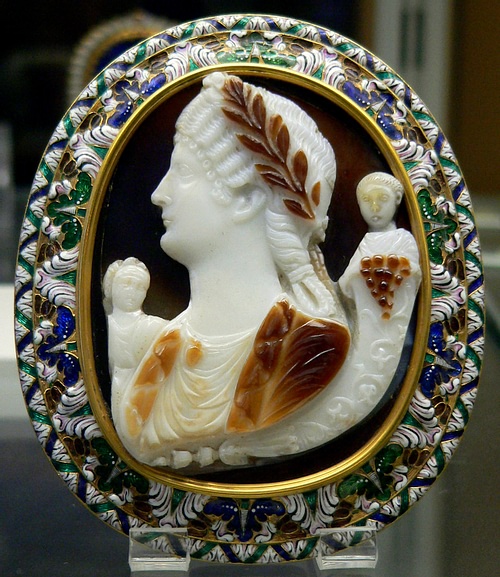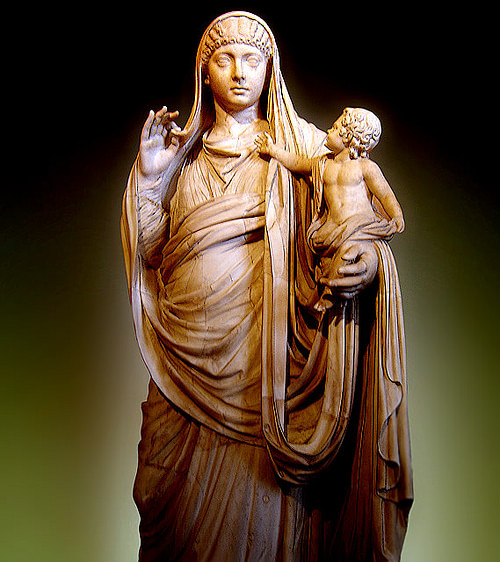
She was about 15 and beautiful, while he was over 50 and the future emperor of the Roman Empire. In 38 CE (dates vary) Tiberius Claudius Caesar Augustus —known to history as Claudius— married his second cousin, Valeria Messalina. This was not a marriage made in heaven; some even claim she only married him to align herself with one of the most powerful families in the empire. Whatever her reason, history would remember him as the emperor who drooled and stammered and her as one of the most controlling, devious, and ambitious women in all of history.
Early Life
Little is known about Messalina before she married Claudius. She was born around 20 -22 CE, the second child and first daughter of a fairly reputable Roman family. She was related to Emperor Augustus —actually his sister Octavia— through both her father and mother. Her mother was Domitia Lepida Minor, the granddaughter of Mark Anthony, while her father (her mother's first cousin) was Valerius Messalla Barbetos, a consul and trusted member of Emperor Caligula's household.
Messalina's future husband was someone who many believed would never amount to anything — his own mother called him a monster. He had been married twice before he wedded Messalina, first to Plantia Urgulanilla (divorced because of supposed adultery) and then to Aelia Paetina (divorced to marry Messalina). His new bride would bear him two children: in 39 CE Claudia Octavia (she would eventually marry Claudius's step-son and heir Nero) and in 41 CE Tiberius Claudius Germanicus better known as Britannicus, born just three weeks before Claudius was found quivering behind a curtain and named emperor. He received the name Britannicus after Claudius's victory in Britain. His birth gave Messalina additional control over Claudius because it provided him with an heir. Unfortunately, Britannicus would be poisoned by his step-brother Nero in 55 CE.
Relationship With Claudius
Messalina's control over the often gullible Claudius became evident shortly after the emperor ordered the return of his nieces from exile in Portia —the daughters of Caligula's brother Germanicus— Agrippina (who would become Claudius' wife number four) and Julia Livilla. Both had been exiled by their brother Caligula after years of abuse. Upon their return to Rome, Claudius returned both their estates and money. Messalina became jealous, especially of the beautiful Julia who endeared herself to the emperor; some believe Messalina feared the two sisters and their husbands might lay claim to the throne, ousting both Claudius and his wife. Messalina brought charges, adultery among others, against Julia and convinced Claudius to exile her. Julia would eventually die in exile from starvation. Her husband, Marcus Vinicius, was also executed on a charge of adultery. Agrippina wisely stayed in the background. The use of trumped up charges like those against Julia was not limited to her; Messalina brought allegations —usually a suspected plot to overthrow Claudius— against anyone who opposed her, and the timid Claudius could not or would not oppose her.
One of Messalina's many faults —and the one most associated with her— was her lack of faithfulness to her husband. Likewise, pity anyone with whom she became infatuated. One of the best examples of this was with her own step-father. After her husband's death, Messalina's mother married Appius Silanus, governor of eastern Spain. Unfortunately for Silanus, Messalina became infatuated with her new step-father; however, he rejected her repeated advances. In 42 CE, in retaliation for this rejection, the empress convinced her friend Narcissus, secretary to Claudius, to claim he had had a vision where Silanus had stabbed the emperor. To further sway the emperor, Messalina alleged she had a similar dream. Claudius, a strong believer in such omens, had Silanus executed. Her infatuations, whether with Mnester the dancer or her step-father, have been the subject of hearsay and gossip for generations. These rumors include her supposed evenings working in disguise at a local brothel.
A “crackdown” on real or imagined conspiracies followed Silanus's execution with numerous deaths and, of course, confiscation of estates. The insatiable Messalina did not limit her passion to only revenge. She also enjoyed the acquisition of objects. A good example of this occurred when she set her sights on the beautiful Gardens of Lucullus, owned by Valerius Asiaticus. Of course, as always, she wanted them and knew how to get them. As with others, Valerius was accused of a conspiracy against the emperor and was slated for execution, but instead of being executed, he was permitted to commit suicide. The gardens were now hers. Many of the more astute senators curried favor with the greedy Messalina, using her influence over Claudius to their own advantage.
Downfall
By 48 CE Messalina's lifestyle and blatant disregard for her husband's reputation and Roman values could not go on indefinitely. Her downfall came when she met a Roman senator named Gaius Silius who, despite initial rejection, fell under Messalina's spell. By this time, Claudius was becoming a laughing stock to many who knew of Messalina's adulteries but feared approaching the emperor. Historians argue whether Claudius knew of his wife's indiscretions or simply chose to ignore them. Messalina's love for Gaius led her to formulate a plan where she and he would overthrow Claudius (he would adopt Britannicus), and they would rule the empire together. While Claudius was out of the city, she forced Gaius to divorce his wife, Junia Silius, and marry her in a simple ceremony. Messalina even moved furniture from the palace into his home.
Narcissus, who had witnessed the wedding, realized the possible consequences of Messalina's actions and informed Claudius, begging forgiveness for his own participation. Word quickly circulated that Claudius was “bent on vengeance.” Realizing that Claudius might waver and forgive Messalina, measures were taken to prevent their meeting. Finally, Messalina understood that she had gone too far, and attempted to sway the emperor by sending Octavia and Britannicus to convince Claudius to forgive their mother. Messalina was ordered to her “garden”; Claudius would see her the next morning. The historian Tacitus wrote:
Messalina, though her peril took away all power of thought, promptly resolved to meet and face her husband, a course in which she had often found safety; while she bade Britannicus and Octavia hasten to embrace their father. [...] Messalina, meanwhile, in the gardens of Lucullus, was struggling for life, and writing letters of entreaty, as she alternated between hope and fury.
Gaius and many of the other wedding guests were immediately executed. Tacitus wrote, “The other guests were flying in all directions when the centurions appeared and put every one in irons where they found them, either in the public streets or in hiding.” A courier was sent to Messalina with orders that she commit suicide; however, when this failed, the messenger, himself, stabbed her. Tacitus said of the suicide, “…she understood her fate and put her hand to the dagger. In her terror she was applying it ineffectually to her throat and breast, when a blow from the tribune drove it through her.” After hearing of his wife's death, Claudius would display no emotion, “no sign of hatred or joy or anger or sadness.” In his The Twelve Caesars, Suetonius mentioned very little about Messalina, only stating:
It turned out that she was not only guilty of other disgraceful crimes, but had gone so far as to commit bigamy with Gaius Silius, and even sign a formal marriage contract before witnesses, so Claudius executed her…
After Messalina, Claudius claimed he would remain celibate. Unfortunately, along came Agrippina —wife number four— and like his other choices for a wife, this one would be no better, for her one and only ambition was to put her son Nero on the throne.









